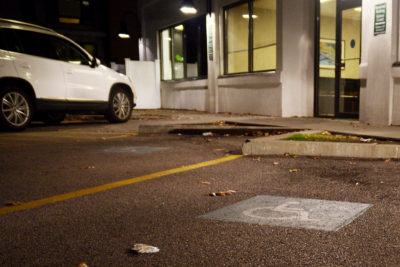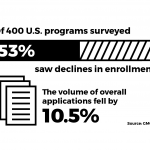
A bill increasing the minimum fines for non-disabled people misusing disabled placards was signed Monday by Massachusetts Gov. Charlie Baker.
Baker was joined by members of the Massachusetts Senate and House of Representatives, as well as the Registrar of Motor Vehicles, Erin Deveney, for the signing of the bill, according to a press release from Baker’s office.
The bill will fine any individual who misuses a disabled or handicap placard with $500 for a first offense and $1000 for subsequent offenses. It also increases the time of license suspensions for handicap fraud and allows the Massachusetts Registry of Motor Vehicles to refuse to process handicap placard applications if an applicant does not provide verifiable documentation of their disability, according to the release.
Mark Sternman, the legislative director and deputy policy director for Sen. Eileen Donoghue, wrote in an email that handicap fraud has become a common issue, inhibiting those who are handicapped from finding parking spaces and depriving cities of necessary revenue.
“This issue affects anyone who drives a car and everyone who has a disabled friend or family member,” Sternman wrote.
Sternman wrote that the issue of misusing handicapped placards extends beyond the city of Boston.
“Sen. Donoghue has heard from constituents in Lowell about this issue and recent media reports have [shown] that this problem also persists in Westfield,” Sternman wrote. “The problem exists throughout Massachusetts.”
Sternman said he hopes the bill will provide more parking revenue to the city of Boston.
“By forcing people who should not use handicapped placards to park in garages or at meters, this law should lead to communities receiving increased revenues from parking,” Sternman wrote.
Many disability organizations support the new bill because it recognizes the importance of disability parking in the community, Joe Bellil, the vice president of Public Affairs at Easter Seals Massachusetts, wrote in an email. He wrote that the bill allows law enforcement to recognize and take action against placard misuse.
“The bill includes language that has the Registry of Motor Vehicles to conduct a study to review the process on how a person obtains a plate or placard,” Bellil wrote.
As more people use placards, Bellil wrote that it is important individuals who are eligible for them use them appropriately. He wrote that he is confident the legislation will prove to be beneficial for Massachusetts families.
According to Bellil, misusing placards takes away the rights reserved for disabled individuals and denies them a community resource.
“As someone who uses a wheelchair, accessible parking spots mean a great deal to me,” Bellil wrote. “If I can’t open my car door all the way to get my wheelchair out, I can’t park in that space. There have been many times that I have gone to locations and have had to go somewhere else because all the accessible parking has been taken.”
Leo Sarkissian, the executive director of The Arc of Massachusetts, an organization that seeks to improve the lives of people who are disabled and their families, said the implementation of substantial fines in the new legislation will send an important message to law abusers.
“It reinforces education to the public at large,” Sarkissian said. “It hopefully limits the extent to which lawbreakers will abuse the use of placards and it will assist cities, towns and the RMV in monitoring the use of placards on an ongoing basis.”
Christine Griffin, the director of the Disability Law Center, said the new bill recognizes the importance of punishing handicapped fraud.
“The new fines should be a deterrent, and that means parking spaces will be available to individuals who need them for access to work, school and recreational opportunities,” Griffin said.
Several Boston residents said they think the new bill will enable people with disabilities to have better access to the parking spots they need.
Matthew Phillips, 28, of East Boston, said he assumes it is difficult to recognize when people are misusing a handicapped parking spot.
“I feel that it’s not right for people to get the placards when they don’t have a disability because it’s unfair that they get to take advantage when everyone else still has to park in the regular spots,” Phillips said.
Gabriel Perez, 70, of Kenmore, said he believes the new bill will discourage people in the community from abusing handicapped placards.
“Overall, it’s just an issue of right and wrong, and teaching the community to be fair and kind,” Perez said.
Bradley Johnson, 24, of Roxbury, said he is confident the bill will receive strong support from anyone who has a disability or a disabled family member.
“It also shows that legislative leaders, agency leaders like the IG, RMV, [the] governor and his administration are strongly supportive of the community,” Johnson said.




